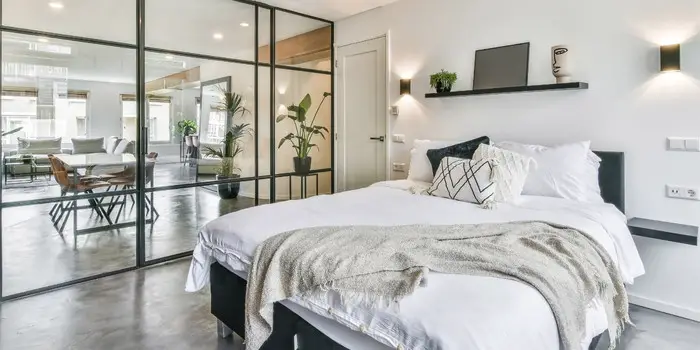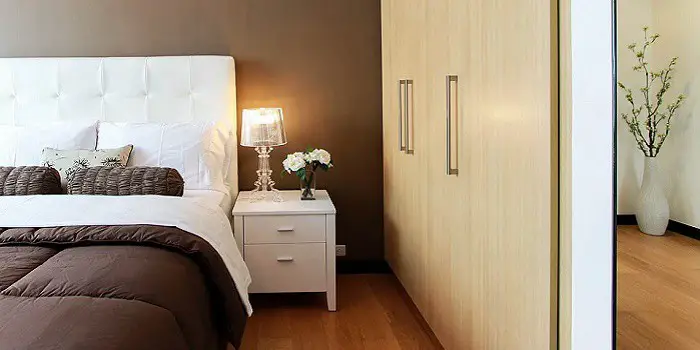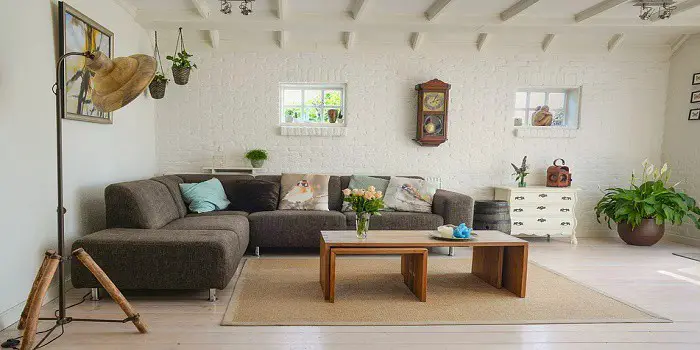
Feng shui is an ancient Chinese philosophy that focuses on balancing the energies of space.
The goal is to create a harmonious environment that promotes well-being.
The practice of feng shui dates back over 3,000 years, and it is based on the belief that our surroundings have a direct impact on our health, wealth, and relationships.
There are many different guidelines for how to apply feng shui principles, but some common methods include placing mirrors in strategic positions to reflect energy, arranging furniture to create a sense of flow, and choosing colors that promote balance.
Feng shui can be used in both residential and commercial settings, and its popularity has grown in recent years as more people seek ways to create calm, relaxing spaces.
5 Elements of Feng Shui
The key elements of feng shui are often described as the five Chinese elements: metal, water, wood, fire, and earth.
However, there are actually nine elements in feng shui, which are derived from the five Chinese elements.
The nine feng shui elements are wood, fire, earth, metal, water, wind, thunder, mountain, and swamp. Each element has a symbolic meaning and represents a different aspect of life.
For example, water is associated with wealth and abundance, while fire is associated with passion and ambition.
By understanding the symbolism of each element, you can use feng shui to create harmony and balance in your life.

What Elements are in Wood?
Wood is one of the five Chinese elements, and it represents growth, new beginnings, and fertility.
The color green is mainly associated with wood, and in feng shui, green is often used to represent health and vitality.
However, wood element colors like blue and teal are also great choices that can be used for wall paint colors in combination.
How can I Use Wood Elements in Feng Shui?
By balancing the five elements in your space, you can create a more harmonious environment that supports your well-being.
That said, there are many ways to incorporate wood elements into your space, depending on your needs and goals.
1- Artwork
If you’re seeking to boost your creativity or manifest your goals, consider adding artwork, paintings, or sculptures that represent the wood element.
Choose pieces that are made from natural materials and that have a simple, clean design.
Avoid using sharp or jagged lines, as these can create negative energy.
2- Wooden Floors
If you want to create more grounding energy, consider adding a wooden floor or using earth tones in your decor.
You can also use rugs or carpets with woodsy patterns to bring the element of wood into your space.
3- Wood Furniture
Another way to bring wood energy into your space is through furniture.
Choose pieces made from natural materials such as wood, bamboo, or wicker.
Avoid using too much metal or glass, as these materials can create a feeling of imbalance.
4- Plants and Water Features
Plants are a common motif in feng shui because they embody the freshness and growth of springtime.
Incorporating plants into your home or office can help to create a more positive, nurturing environment.
If you’re looking to promote fertility or new beginnings, you might also consider adding a water feature along with plants.
5- Wallpaper on Walls
If you’re feeling more daring, try wallpaper with long vertical shapes or botanical designs in green or blue.
If wallpapering the entire room seems too much, you may always start with an accent wall or the inside of a closet or cabinet.

How Do I Feng Shui My Bedroom for Good Luck?
Feng shui is the Chinese practice of harnessing positive energy through element balancing, placement, and orientation.
The goal is to allow wind and water forces to flow freely throughout a space, unencumbered by obstacles that might block or corrupt positive energy flow.
Bedroom furniture layout is essential in feng shui because it affects the direction your body will face while you sleep, which can influence your health and luck.
Don’t think of it in terms of energy, but how it affects your emotions.
You’ll understand better as we go through each rule and explain its rationale. It balances the five elements: wood, fire, earth, metal, and water.
Let’s get into bedroom feng shui rules, ideas and layout right away, explain the logic behind them and illustrate how they work with some ideas…
1. Make the bedroom door visible
This means the door should not be blocked when you are in bed. Blocking the door is said to block good energy or opportunities from coming into your life.
You might be wondering which way is best to place your bed in relation to your bedroom door.
I believe it’s better to have the foot of your bed facing the door so that there’s more distance between you and any potential intruder.
This also allows for more reaction time if something were to happen.
However, some people choose to have their bed placed in a “commanding position,” with the side of the bed perpendicular to the doorway, so they can see everything happening in the room at once.
Only do this if it doesn’t bother you mentally. Otherwise, the ideal placement for your bed is near the foot of the door, and it’s better still if it’s aligned with the door. This makes you feel calm by reducing feelings of danger.
2. Put up only the calming artwork
Keep your artwork simple and calming. Anything too busy or loud will work negatively against promoting a good night’s sleep.
Consider prints of paintings with muted colors or serene landscapes. This balances your life force by generating positive energy in the room where you rest at night.
Unless you have more than one piece of art, don’t put it over the headboard of your bed. It’s okay if you have several pieces of art, but your most prominent wall art should be on the unbroken wall across from where your bed ends.
This is, so you see it as soon as you wake up and begin your day with a peaceful state of mind.
A feng shui consultant will say it’s also the last thing you see before falling asleep at night – but we all know that these days, that spot is either occupied by a book or our cellphones, which goes against another rule.
3- Use natural light, scented candles & incense
The moon and the sun are potent chi stimulants. They assist you in maintaining your circadian rhythm, melatonin levels, and energy levels throughout the day.
You desire any window curtains to be instantly opened and closed, as well as for your window to face away from your bed.
If the window is behind or at the foot of the bed, you won’t get much light; if it’s at the head of your bed, you’ll receive too much light when sleeping.
It’s also essential that you do not cover your window with a dresser or your headboard. You want it to be visible and functional.
Opening your window in the morning and evening can allow fresh air and chi to enter.
Also, fresh, chilly air with natural odors in the evening will put you to sleep quickly, giving you a restful night’s sleep. So it’s also a good idea to use scents.
Auspicious fragrances repel harmful energies and make you feel calm and at ease. Also, they disguise unpleasant odors such as a clothes hamper or a cat litter box.
You may utilize these scented candle options to complement the ambiance you’ve created with your color scheme.
There are many benefits to burning candles in your home. Candles can bring romance and calmness to meditation and provide some fire energy to balance the chi.
They can also provide dimmed lighting as needed. If you’re into incense, that’s a great choice too!
4- Reduce clutter and no electronics, please
Clutter obstructs the free circulation of life energy and is psychologically distressing. Consider minimalist design as you decorate and arrange your bedroom to get started on the correct track.
It’s soothing to fill a room with things you enjoy and are familiar with. This tends to aid in creating a space that feels yours solely.
However, in a bedroom, you want spaciousness without distractions so you may engage with it.
You’re aiming for reduced excitability and increased necessary relaxation. Cluttering makes life difficult; clutter-free living is the way to go. Extra novels, cushions, nightstands, and other items fall into this category.
Furthermore, only light should be allowed in your bedroom – no electronics. If you can avoid lamps, that’s even better. Not everyone has large enough windows pointing in the right direction, though.
You may be wondering why such a stringent rule. Well, electric lighting generates artificial light. Digital alarm clocks have blinking lights, as well as other sorts of clocks.
They all produce electromagnetic fields that may disrupt the flow of Chi. They also prevent your room from reaching its optimum level of darkness, affecting your sleep cycle.
5- Avoid sharp corners and large mirrors – use rounded furniture
You’ll have to decide whether this matters to you.
It does not bother me, but the idea is that chi has a more challenging time flowing around corners than it does on rounded surfaces. As a man, I am personally drawn to the masculinity of dark-stained wood furniture pieces that have defined edges.
If you must have sharper angles, ensure they aren’t directed at your bed. They act much like poison arrows that splice the energy in those areas. In this instance, a round side table is superior to a square one.
Although, a square side table with routed and smooth edges that are rounded produces a more calming effect than one with no decorative edge features at all. This is primarily based on what allows your mind to settle and relax more.
Also, in the bedroom, it’s good to avoid oversized mirrors. The disadvantages of large types of mirrors in the bedroom, especially ceiling-to-floor mirrors, are many.
They create the impression that the space is twice as big, which violates all visual balance by duplicating the space.
According to feng shui beliefs, not only do mirrors attract chi, but they also push it away in the opposite direction. It generates too much movement, which implies activity and is therefore opposed to tranquility.
6- Don’t use plants in the bedroom
Now, this can be counterintuitive to what I said before, but it’s believed to be a bad Feng Shui when you use any indoor plants in the bedroom.
It’s OK to use them in other parts of your home, like the living room, but not the bedroom – it’s the opposite here.
The plant’s leaves absorb all the negative energy in your bedroom and then release it back into the room, which is not what you want.
If you love plants and can’t stand the idea of not having any in your bedroom, then some plants are better than others.
The best plants for the bedroom are Bamboo, Snake Plant, Orchids, and Jasmine.
These plants are known to filter out negative energy and replace it with positive energy.
Other than plants, you should also not use your bedroom for other purposes the whole day.
To keep a healthy balance of energy in your bedroom, only use it for activities related to sleeping and storing clothing.
This includes making your bed every morning and keeping clothes off the floor. By decluttering your space and ridding it of non-sleep items, you train your mind to relax more quickly in the bedroom, creating positive chi energy.
7. Don’t locate your bed beneath a ceiling fan or a beam
The idea is that you don’t want anything hovering over your head while you’re trying to sleep.
This includes things like ceiling fans, beams, or even a skylight. All these things can create an ominous feeling that weighs down on you while trying to relax and get some rest.
Instead, using a solid headboard on your bed is a great idea.
A headboard is not only a great way to add some style to your bedroom, but it also provides a feeling of stability and support. Plus, it gives you something to lean against while reading in bed.
Final Thoughts
In feng shui, wood is represented by the color green. Green is associated with growth, new beginnings, and fertility.
Indoor plants are a common motif in feng shui because they embody the freshness and growth of springtime.
However, decorative items like sculptures and paintings can also represent wood elements.
No matter what elements you choose to incorporate into your space, the goal is to create a more harmonious environment that supports your well-being.
So, choose them wisely!

Hi, I am Mark Garner a professional carpenter, woodworker, and DIY painter. I live in the small city of Peoria, Arizona as a semi-retired woodworker. I have started this blog with a simple motive to help you with my wood experience in this sector. If you like to know more about what I love doing and how it all got started, you can check more about me here.





